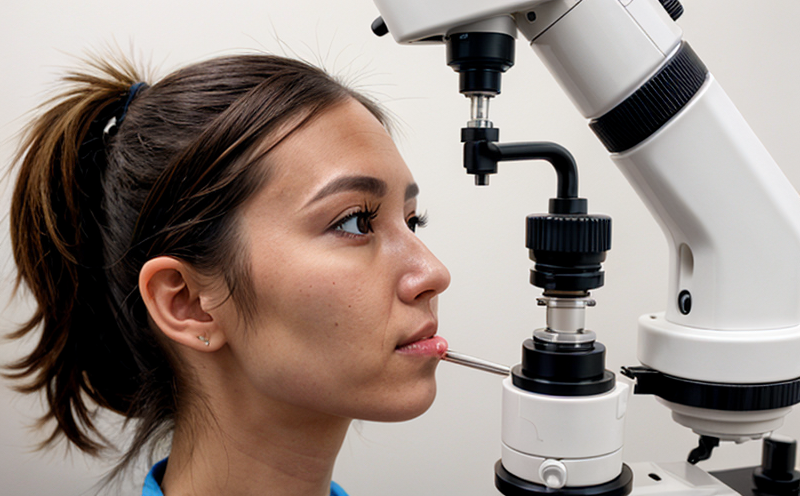Ophthalmic Device Testing
The field of medical device testing is critical to ensuring the safety and efficacy of products used in healthcare. Within this domain, ophthalmic devices play a pivotal role in diagnosing and treating ocular conditions, enhancing vision, and improving quality of life for millions worldwide. Properly designed and rigorously tested devices are essential to prevent adverse events such as corneal abrasions, infections, or other complications.
Ophthalmic devices encompass a wide range of products including contact lenses, intraocular lenses (IOLs), ointments, diagnostic tools like tonometers, and surgical instruments. The testing process for these devices must adhere to stringent international standards such as ISO 10993-1:2018, which covers general requirements for the biological evaluation of medical devices.
The testing methodology typically involves several stages aimed at evaluating both biocompatibility and performance characteristics:
- Biocompatibility Testing: This includes toxicological assessments to ensure that the materials used in the device do not cause adverse reactions when in contact with biological tissues. Common tests under this category are cytotoxicity, sensitization, ecotoxicology, and hemocompatibility.
- Performance Testing: Ensures that the device functions as intended under normal conditions of use. For example, a tonometer must accurately measure intraocular pressure without causing discomfort or injury to the patient.
- Usability Evaluation: Assessing how easy it is for healthcare providers and patients to use the device safely and effectively. This involves user testing and ergonomic assessments.
The laboratory environment plays a crucial role in these tests, providing controlled conditions that simulate real-world scenarios. Our state-of-the-art facilities are equipped with advanced instrumentation such as scanning electron microscopes (SEM) for detailed surface analysis and automated tonometers to ensure accurate pressure measurements.
In addition to technical expertise, our team of quality managers ensures compliance with regulatory requirements set by agencies like the FDA and CE marking standards. This comprehensive approach guarantees that every ophthalmic device leaving our laboratory meets rigorous safety and efficacy benchmarks.
Scope and Methodology
The scope of ophthalmic device testing extends beyond mere compliance with regulatory guidelines; it encompasses a broad spectrum of tests designed to evaluate multiple aspects of the product. The primary focus is on ensuring biocompatibility, which involves assessing the potential for adverse biological responses due to interactions between the material and human tissues.
- Biocompatibility Tests: These include in vitro cytotoxicity studies using cell lines to determine whether the device material triggers cellular damage or death. Additionally, sensitization tests help identify allergenic properties of the materials used in the device.
- Bacterial and Fungal Testing: Ensuring that the product does not harbor microorganisms capable of causing infections is critical for ocular devices. Sterility testing using standard methods like membrane filtration or direct inoculation onto agar plates provides assurance of sterility.
- Particle Analysis: Particles present in contact lenses, for instance, can cause irritation or even damage to the cornea if not controlled properly. Particle size distribution and morphology are evaluated under SEM.
- Intraocular Pressure Measurement Accuracy: For tonometers and other devices measuring intraocular pressure, accuracy is paramount. Calibration standards based on ISO 10993-24 ensure that these measurements align closely with accepted norms.
The methodology employed in our laboratory ensures thoroughness while maintaining efficiency. Each test adheres to relevant international standards such as ISO and ASTM, ensuring consistency across all projects. Our approach allows us to provide accurate results that can be trusted by clients seeking to validate their products before market release.
Quality and Reliability Assurance
At our laboratory, quality assurance is not just a process but a philosophy embedded deeply into every aspect of our operations. From sample preparation to final reporting, meticulous attention to detail ensures that each test conducted meets the highest standards.
- Sample Preparation: Proper handling and preparation are crucial for accurate results. Our team follows standardized protocols outlined in ISO 13485:2016 to ensure consistency.
- Data Collection and Analysis: Utilizing advanced software tools, data is collected systematically and analyzed thoroughly using statistical methods compliant with IEC 62304.
- Validation of Equipment: Regular calibration and validation of all equipment against traceable standards guarantee precision in measurements. This adherence to ISO/IEC 17025 ensures reliability throughout the testing process.
The commitment to quality extends beyond internal procedures; we also participate actively in proficiency testing programs organized by recognized bodies like AAFS (American Association for Accreditation of Laboratory Services). Participation in such programs provides independent verification of our capabilities and enhances credibility with regulatory authorities.
Our rigorous approach to QA helps build trust among clients who rely on us for crucial validation work. By consistently delivering reliable results, we contribute significantly to the advancement of medical technology by helping manufacturers bring safe and effective products to market faster.
Customer Impact and Satisfaction
The success of any laboratory lies not only in its technical capabilities but also in its ability to meet customer expectations effectively. In the case of ophthalmic device testing, this means providing accurate, timely results that enable clients to make informed decisions about their products.
- Prompt Turnaround Times: We understand that time is of the essence for medical device manufacturers. Our streamlined processes ensure that tests are completed efficiently without compromising on accuracy or thoroughness.
- Comprehensive Reporting: Beyond raw data, comprehensive reports provide insights into potential risks and opportunities for improvement based on our analysis. This holistic view helps clients refine their designs and enhance product performance.
- Supportive Consultation: Our experienced staff offers guidance throughout the testing process, addressing any concerns promptly and ensuring that all regulatory requirements are met.
The feedback we receive from satisfied customers attests to our commitment to excellence. Their trust in us reflects well on both them and their products. By consistently delivering high-quality services, we contribute positively to the healthcare industry’s progress towards safer, more effective treatments and devices.





